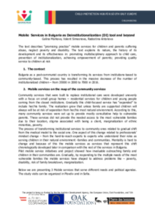Ending Child Institutionalization
Displaying 661 - 662 of 662
As part of phase one of the development of the Martin James Foundation's Asia Care Network, comprehensive studies of the care system in each country were conducted to highlight the need for developing alternative care systems across South-East Asia.
This text describes “promising practice” mobile services for children and parents suffering abuse, neglect poverty and disability in Bulgaria.

